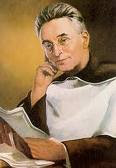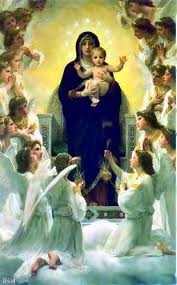Much as in the same way it is said that in big cities one is never more than 12 feet from a rat, so it is with the demonic. The devil and his demons go rampaging throughout the world looking for souls to master and destroy and the evil one is never more than a few feet from us..
 |
"Even priests can be affected
by the demonic" |
Archbishop Fulton Sheen (whose cause for beatification is being forwarded in Rome right now) made a telling statement in one of his retreats for priests series. He said that, out of an audience of 50 or 60 priests, there would always be one or two who were tinged with the demonic.
"Mention the sacrifice of Calvary as re-enacted in the Mass and they would begin to shift uncomfortably in their seats.
By the end of the day they would be gone!"
He would go on to state that this contact with evil surrounds us in our daily lives.
I do not mean (and the Archbishop did not mean) that such people were actually possessed of a demon (although that may have been the case in some instances), it was more a situation where some element of the demonic had been allowed to enter their minds. The avenues for such a possibility are, of course, endless and they perhaps pervade the life of the Church today more than at any other time in its history.
Pornography, paedophila, marriage breakdown, drug abuse, homosexuality, perversions of every form, disbelief in the the Sacred Species, "liberated" nuns, women priests, apostasy and just plain everyday secular wrongdoings.
All have an essence of the demonic but, normally, due to our practice of regular Mass attendance and reception of the Sacraments and the subsequent graces we receive, we are able to automatically fend off most, if not all that Satan sends our way. We should not forget, either, the power of our Guardian Angel who must be fully occupied in overseeing our spiritual welfare.
The author, Patrick Leigh Fermor in his book "A time to keep silence" records that, in monasteries, the holy men enclosed are subject to bombardments by Satan. He describes one monk stating that the skies over the monastery at night are dark with demons. This is a very real and powerful threat and it is only their strong mindset and inherent spirituality that keeps them safe.
But open minds are empty vessels awaiting the devil's potions. When we used to attend Mass at the Mill Hill Fathers rural base, Courtfield, on the Herefordshire/Monmouthshire borders, the great Father Hughes often used to include accounts of his travails in Africa in his sermons. He spent many years in the wilds, like most Mill Hill Fathers and Brothers, and most of the time he would be the only priest for many miles around. I remember his account of receiving a late night call to attend a dying woman some 30 miles distant.
Packing up his case containing the Blessed Sacrament and the sacred oil and all other materials necessary for the administration of the Sacrament of Extreme Unction (it was called that 50 years ago) he mounted his motor bike and set off for the distant village.
Arriving finally he was shown to a hut where the sick woman lay. He entered holding aloft his Tilley lantern only to see the woman lying on a settle against the far wall. He had not fully entered the room before she turned to glare at him ferociously whilst her whole body levitated upwards for about 3 to 4 feet and she screamed: "I do not want you or He whom you bring with you."
Now, according to Fr Hughes, it was at this point that he turned on his heels and fled; returning to the Mission a damn sight faster than he came.
I am sure that he did flee for his life. A priest untrained in exorcism and unprepared physically and spiritually would be very hard put to counter a full on demonic attack. The great danger being, of course, that the demon might overpower him and take control.
But possession is not rare in underdeveloped countries where people have, for many years, been under the influence of pagan beliefs and ceremonies. And it is becoming increasingly common in the developed world where poor education (I mean poor Catholic education) and a lack of intellectual rigour are becoming increasingly prevalent. That is not just a malfunction of the social framework, it is, undoubtedly, Satan weaving the web of despair, dissolution and dissipation that affects so many young people today.
He has an easy target (although, since 2005 and the advent of Pope Benedict, we have begun to re-consolidate and even started regaining lost ground) but we now have two or three generations of 'latch key' children who are now parents and grandparents in their own right. And the seeds of indifference and neglect have long since grown to fruition even to the stage of being beyond recovery.
Economic statistics used to indicate (and probably still do) that, when a person has been unemployed for more than 18 months, the likelihood of them returning to the workplace was negligible. The habit of being idle and taking state handouts had become too ingrained.
So it is with the spiritual life. Do nothing, take the handouts of violent video games, cheap cider, drugs, street crime, pornography and abortion as a means of birth control and you have a potent mix that provides easy pickings for you know who!
What can be done? How can one rewind the clock and get matters onto a footing where at least the young, the down and outs and homeless are given a chance. We don't have the vocation numbers yet to launch a crusade, I'm not sure that, in episcopal circles, there is even a will to do so. But, we should not be prepared to roll over and accept what Satan throws at the world.
 |
The best of weapons -
recourse to Our Lady |
We must keep in mind the weapons that are at our disposal; heading the list, of course, is Our Blessed Mother, she whose heel is firmly planted on the head of the serpent. The Rosary is all powerful in this regard and is positively hated by Satan. Next comes recourse to the saints, especially those with accredited powers to overcome the devil and all his works and pomps (St Anthony, St Michael, (Padre) St Pio and St Paul of the Cross spring to mind, I am sure there are more).
Next come the outward signs of our faith that so many families neglect today. The blessing of one's house by a priest, the Epiphany chalk, a crucifix in the home, holy candles at hand, a holy water font at the side of the front door, a palm cross, statues of the saints and mementoes of the holy life - forget the strings of garlic......these things are the real McCoy and your doorstep need never be fearful of a visit by the dark angel.
And your children and friends will become encouraged to do the same; visitors to your house will benefit from exposure to the sacred rather than the profane.
 |
Prayer to Defeat the Work of Satan
O Divine Eternal Father, in union with Your Divine Son and the Holy Spirit, and through the Immaculate Heart of Mary, I beg You to destroy the power of Your greatest enemy – the evil spirits. Cast them into the deepest recesses of hell and chain them there forever! Take possession of Your Kingdom which You have created and which is rightfully Yours. Heavenly Father, give us the reign of the Sacred Heart of Jesus and the Immaculate Heart of Mary. I repeat this prayer out of pure love for You with every beat of my heart and with every breath I take. Amen. |
Even if you can only do one thing, make it the placement of a blessed crucifix in a prominent position in your home and ask your family and friends to do the same. It may not get rid of the rats but it will certainly get rid of Satan.






























